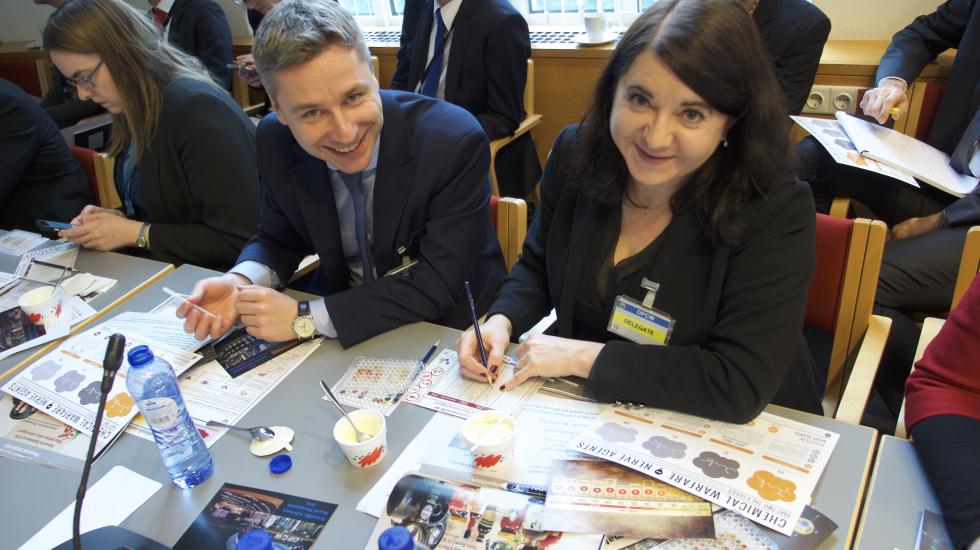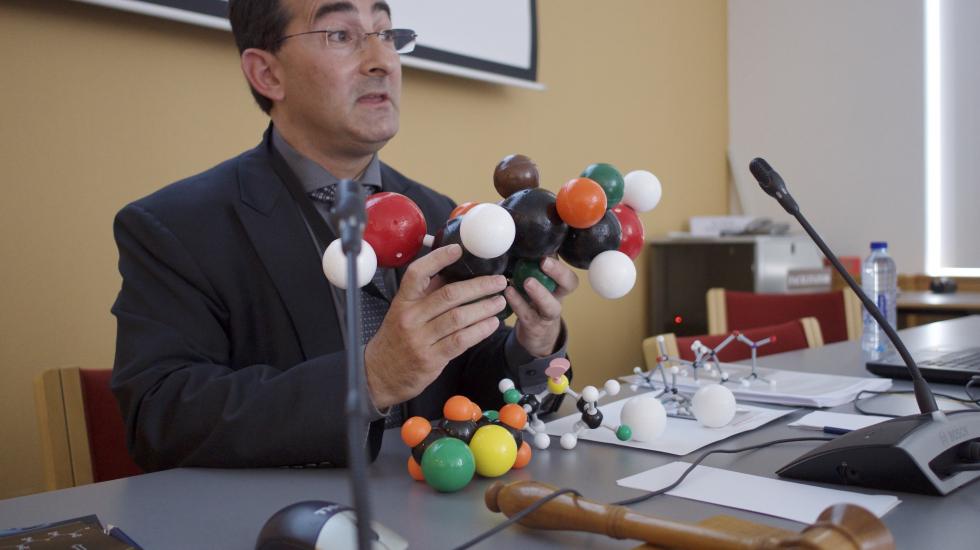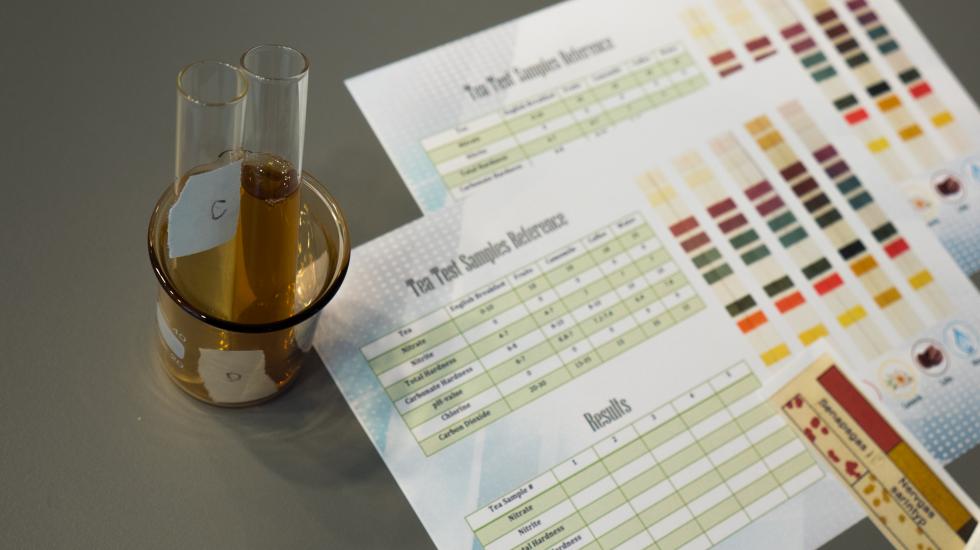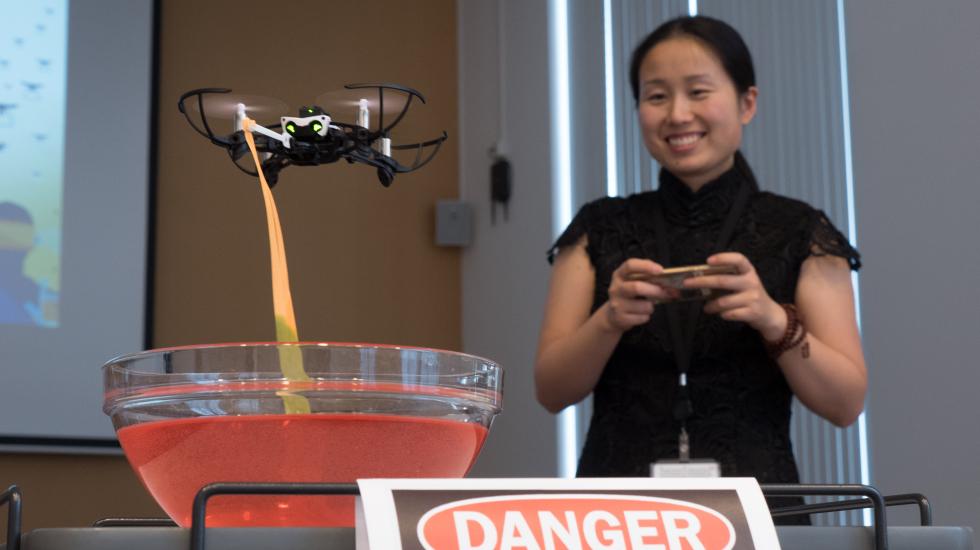The Chemical Weapons Convention is built on a scientific foundation; it requires scientific and technological expertise to implement. The OPCW has fostered discourse between scientists and the policymakers of the Convention, ensuring scientific literacy for decision makers and allowing the OPCW to keep pace with technological change.

Delegates taking part in OPCW’s interactive Science for Diplomats initiative

OPCW's Science Adviser explaining molecular structure

Learning how to perform tests for chemical signatures

An OPCW intern performing chemical testing by drone in a Science for Diplomats briefing
The resources help stakeholders gain a better understanding of scientific aspects of OPCW’s work, promote scientific literacy, and help them recognise where technological changes can benefit and challenge the implementation of the Convention.
Engaging with Diplomats
Organised by the OPCW’s Office for Strategy and Policy (OSP), the Science for Diplomats initiative provides an informal and interactive forum to help diplomats and policymakers stay well-informed about science and technology relevant to the Chemical Weapons Convention. The Science for Diplomats side events are held during meetings of the Executive Council, Conferences of the States Parties, and Review Conferences
The events play an important role in promoting science literacy through presentations, hands-on activities, quizzes, demonstrations, and Q&A sessions. Since 2014, a wide range of science and technology topics has been covered, helping to bridge the gap between technical experts and policymakers. The most recent events have included chemical forensics, biotoxins, artificial intelligence, drones, 3D printing, and scheduled chemicals.
Science for Diplomats events are currently held twice a year and are open to all delegates. Join the OSP Science Team at our next event!
Convergence of chemistry and biology
| Title | Date |
|---|---|
| Biotoxin bootcamp: saxitoxin, ricin, and beyond | 28 November 2023 |
| Biotoxins quiz | 28 November 2023 |
| Biotoxins reference guide | 28 November 2023 |
| Trends in bioproduction and bioreactor design | 28 November 2017 |
| Spiez CONVERGENCE 2016 | 30 November 2016 |
| The science of the bioeconomy | 5 December 2014 |
| Spiez CONVERGENCE 2018 |
Developments in science and technology
| Title | Date |
|---|---|
| Atoms and algorithms: exploring AI for chemistry | 25 November 2024 |
| Temporary working groups of the SAB (poster) | 7 March 2024 |
| A tech-tacular guide | 16 May 2023 |
| Advances in science and technology: risks and opportunities | 16 May 2023 |
| Transdisciplinary developments in science and technology | 9 March 2023 |
| Science and technology at the 4th Review Conference | 13 March 2018 |
| Innovation and the CWC | 10 October 2017 |
| Innovation and the CWC (SAB Chair) | 10 October 2017 |
| Emerging technology and the work of the SAB | 28 November 2016 |
| Autonomous systems and AI in chemistry | 30 November 2015 |
| Scientific discovery, technology development, and the role of the Scientific Advisory Board | 26 June 2014 |
Investigative science and chemical forensics
| Title | Date |
|---|---|
| Chem-ecting the dots | 6 March 2024 |
| Chemical forensics reference booklet | 6 March 2023 |
| TWG on Investigative Science and Technology: update 2 | 27 November 2019 |
| TWG on Investigative Science and Technology: update 1 | 23 November 2018 |
| TWG on Investigative Science and Technology | 25 April 2017 |
| Workshop on chemical forensics | 30 November 2016 |
| Chemical forensics | 2 December 2015 |
Riot control agents
| Title | Date |
|---|---|
| What defines a riot control agent? | 8 March 2017 |
Sampling and analysis
| Title | Date |
|---|---|
| Chemical weapons sample stability and storage | 12 October 2016 |
| Conducting analysis of biomedical samples | 10 October 2014 |
| Biomedical sample analysis | 10 October 2014 |
| Chemical analysis in verification | 9 July 2014 |
Scheduled chemicals
| Title | Date |
|---|---|
| Mini-guide to the Annex on Chemicals | 30 November 2022 |
| The chemical universe: scheduled and unscheduled | 10 July 2018 |
| VX: a brief for States Parties | 9 March 2017 |
| Isotopic labels, stereoisomers, and scheduled chemicals | 13 July 2016 |
| Schedule 1 chemicals in industrial processes | 17 March 2015 |
Chemical production
| Title | Date |
|---|---|
| Illiminating chemical reactivity | 10 July 2019 |
| International workshop on trends in chemical production | 28 November 2017 |
| An introduction to the OCPF site selection methodology | 6 October 2015 |
Toxicity, protection, and medical countermeasures
| Title | Date |
|---|---|
| Chemical action on life processes | 9 October 2019 |
| The science and technology of physical protection | 9 October 2018 |
| Workshop on chemical warfare agents | 30 November 2016 |
| The science of medical countermeasures | 8 July 2015 |
| Agents and their medical countermeasures (poster) | 8 July 2015 |
SAB updates
| Title | Date |
|---|---|
| Scientific Advisory Board briefing to States Parties | 11 June 2015 |
